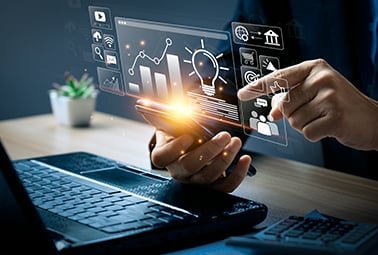
In 2025, Artificial Intelligence (AI) is no longer a buzzword — it’s the backbone of modern digital marketing. With technological advancements and increasing competition in the digital space, AI is empowering businesses to understand their audiences, personalize experiences, and drive better ROI like never before.
This blog explores how AI is transforming digital marketing in 2025 and what businesses should know to stay ahead.
What Is AI in Digital Marketing?

AI in digital marketing refers to using machine learning algorithms, data analytics, natural language processing, and automation tools to analyze consumer behavior, predict trends, and deliver personalized experiences. AI helps marketers make real-time decisions, automate repetitive tasks, and optimize campaigns for better results.
In 2025, AI has moved from optional to essential for competitive marketing strategies.
Key Roles of AI in Digital Marketing in 2025
1. Hyper-Personalization
Today’s consumers expect personalized content at every touchpoint. AI uses customer data — like past purchases, browsing history, location, and behavior — to deliver tailor-made experiences in real time.
Examples:
- Personalized emails with product recommendations.
- Dynamic content on websites that changes based on user action.
- AI-powered chatbots offering custom suggestions.
2. Predictive Analytics for Better Decision-Making
AI algorithms in 2025 can accurately predict future customer behavior using historical data and behavioral patterns. This allows marketers to:
- Forecast sales trends.
- Identify high-value customers.
- Determine the best times and platforms to launch campaigns.
Predictive analytics helps reduce wasted ad spend and increase conversions.
3. AI-Driven Content Creation
With the rise of tools like ChatGPT and other generative AI platforms, AI is helping marketers create high-quality content faster. In 2025, marketers use AI to:
- Generate blog posts, ad copies, social media captions.
- Create product descriptions at scale.
- use sentiment analysis and keyword suggestions to optimize content for search engines.
While human creativity still leads, AI enhances productivity and consistency in content marketing.
AI Automation: Streamlining Campaign Management

4. Smart Ad Targeting
Platforms like Meta Ads and Google Ads now use advanced AI to automatically identify and target the most relevant audiences. In 2025:
- AI manages ad bidding in real time, adjusting budgets to maximize ROI.
- Campaigns are optimized for user intent rather than just demographics.
- Retargeting strategies are more accurate based on AI-analyzed behavior.
This results in lower ad costs and higher engagement.
5. AI-Powered Email Marketing
Email marketing continues to be effective in 2025, but AI has made it smarter:
- Send times are optimized per recipient.
- Subject lines and email content are personalized using AI algorithms.
- AI segments users automatically based on behavior and engagement levels.
The result? Higher open rates and click-through rates with less manual work.
Conversational Marketing Through AI
6. Chatbots and Virtual Assistants
AI chatbots in 2025 are more human-like, context-aware, and capable of handling complex queries. They’re available 24/7, offering:
- Instant responses to customer questions.
- Product recommendations based on real-time conversation.
- Integration with CRM tools for seamless support.
These bots improve customer experience and free up human agents for higher-level tasks.
7. Voice Search Optimization
With the growth of voice-enabled devices like Alexa, Siri, and Google Assistant, voice search now dominates how users search online. AI helps brands:
- Optimize for conversational keywords.
- Structure content to appear in voice search results.
- Use AI tools to analyze voice query trends.
Voice SEO will be a common component of digital marketing strategies by 2025.
Visual & Video AI in Marketing
8. AI Video Creation and Editing
Video continues to be the most consumed content type. AI tools can now:
- Automatically generate short promotional videos from blog content.
- Edit videos, add captions, and suggest thumbnails.
- Analyze viewer engagement and adjust content accordingly.
Marketers save time and create more effective visual content using AI.
9. Image Recognition for Product Discovery
AI image recognition technology allows customers to:
- Upload a photo and find similar products online.
- Scan real-world items to receive brand recommendations.
In e-commerce and retail, this visual search capability powered by AI boosts customer engagement and increases sales.
Ethical Use and Challenges of AI in 2025

While AI offers many benefits, there are also concerns:
- Data privacy: As AI depends on user data, marketers must follow strict regulations like GDPR and CCPA.
- Bias in algorithms: Marketers must ensure that AI tools don’t amplify discrimination or bias.
- Over-automation: Over-relying on AI can result in generic messaging if not monitored properly.
Successful businesses use AI ethically and strategically, balancing automation with human touch.
What’s Next: AI and the Future of Digital Marketing
The future of AI in digital marketing seems bright.In the coming years, we can expect:
- Deeper AI integration into CRM and marketing automation tools.
- AI-generated 3D and AR content for immersive experiences.
- Real-time multilingual content translation with contextual accuracy.
- Emotion AI that adjusts marketing based on user mood and facial expressions.
In 2025, AI is not replacing marketers — it’s empowering them to be more creative, data-driven, and responsive than ever before.
Final Thoughts
AI has revolutionized digital marketing by making campaigns smarter, faster, and more personalized. In 2025, brands that embrace AI are not just ahead of the curve — they’re defining it.
Whether you’re a small business or a global enterprise, integrating AI into your digital strategy is no longer a luxury — it’s a necessity. The key lies in using AI responsibly, creatively, and in alignment with your brand goals.
The future of digital marketing is AI-powered — and the future is now.



